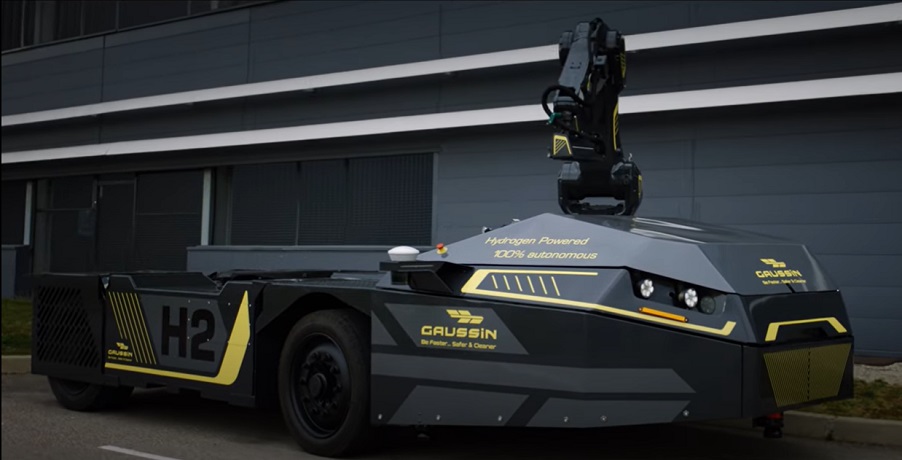
Gaussin unveils autonomous tractor with hydrogen fuel cell engine
April 15, 2021The vehicle is equipped with a robotic arm and could one day change the face of logistics.
Gaussin has announced its new hydrogen fuel cell engine in an automated yard tractor, equipped with a robotic arm. The vehicle was created for major players in e-commerce and logistics.
The unveiling has the potential to provide important solutions and meeting sizeable industry demands.
The current demand for reliable zero-emission logistics vehicles capable of handling massive workloads is very high in the logistics industry. This automated tractor with a hydrogen fuel cell engine has the potential to be able to help meet that demand.
The zero-emission yard automation was created in Gaussin’s effort to meet the needs logistics players have for automated solutions that are also environmentally friendly. This is an industry associated with substantial carbon emissions and that is seeking to transition through decarbonization strategies. The new H2 powered vehicle could be used for moving semi-trailers, trailers, and could swap bodies between the docks and the equipment parking areas.
The robotic arm has made the hydrogen fuel cell engine powered vehicle even more unique.
The robotic arm on this H2 powered vehicle is a highly unique feature but that helps to solve a spectrum of challenges. It makes it possible to connect and disconnect air and electrical connectors that link the tractor and trailer. That robotic arm functions through the use of cameras. Its software reads the camera to allow it to automatically recognize the type of connector. From there, it can set the type of connection manoeuvre required. Once that has been determined, it can complete a range of central functions necessary for yard operations.
The automated hydrogen fuel cell engine tractor will begin real world testing in both the United States and Europe. Two major e-commerce and logistics operators have already been lined up for trialing the technology. The purpose of these real-world tests is to verify the system’s performance within the  configuration of customer sites. It will also make it possible to further develop a deployment plan for the hydrogen fuel cell engine tractor before this year comes to a close.
configuration of customer sites. It will also make it possible to further develop a deployment plan for the hydrogen fuel cell engine tractor before this year comes to a close.



 HFN News is your leading source for fresh hydrogen and renewable energy updates. Amid the fast-paced growth of hydrogen companies, we provide top-notch news and insights about this exciting sector. Our coverage spans from hydrogen cars to global sustainable initiatives, and we highlight the latest in green jobs and developing hydrogen hubs. We invite you to share your local hydrogen news and explore today’s renewable energy job listings on our site. Thanks for choosing HFN News as your trusted guide to the hydrogen and renewable energy world!
HFN News is your leading source for fresh hydrogen and renewable energy updates. Amid the fast-paced growth of hydrogen companies, we provide top-notch news and insights about this exciting sector. Our coverage spans from hydrogen cars to global sustainable initiatives, and we highlight the latest in green jobs and developing hydrogen hubs. We invite you to share your local hydrogen news and explore today’s renewable energy job listings on our site. Thanks for choosing HFN News as your trusted guide to the hydrogen and renewable energy world!